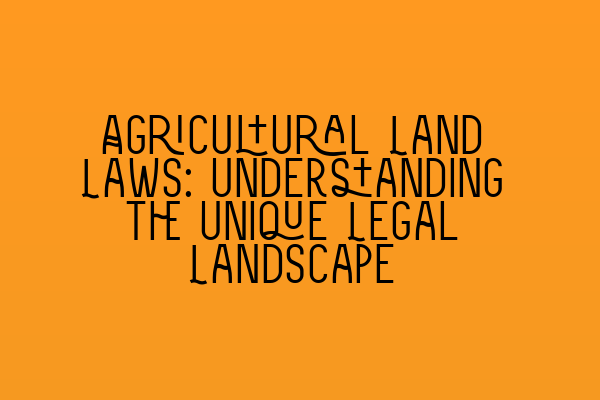Agricultural Land Laws: Understanding the Unique Legal Landscape
Agricultural land plays a critical role in the economy and the livelihood of farmers across the country. The legal framework surrounding agricultural land is complex, as it encompasses a unique set of laws and regulations that govern ownership, use, and management. Understanding these agricultural land laws is essential for both landowners and those working in the property law sector.
The Basics of Agricultural Land Laws
When it comes to agricultural land, several fundamental laws and regulations come into play. These include:
1. Agricultural Holdings Act 1986: This act governs the relationship between landlords and tenants on agricultural holdings. It outlines the rights and obligations of both parties, including matters related to rent, repairs, and termination of tenancies. Understanding this act is crucial for farmers, landowners, and solicitors involved in negotiating tenancy agreements.
2. Agricultural Tenancies Act 1995: This act introduced the concept of farm business tenancies (FBTs), replacing the traditional agricultural tenancies. FBTs provide more flexibility for both landlords and tenants, allowing for shorter-term agreements and greater freedom to negotiate the terms of the tenancy. Knowing the provisions of this act is essential when dealing with agricultural tenancy agreements.
3. Common Agricultural Policy (CAP): The CAP is an EU policy that governs the allocation of subsidies and support for farmers. Although the UK has left the EU, the CAP still has implications for agricultural land in terms of funding and environmental regulations. Understanding the CAP provisions is crucial for landowners and farmers to ensure compliance and take advantage of available financial support.
4. Environmental Stewardship Schemes: These schemes are designed to promote sustainable farming practices and environmental conservation on agricultural land. They provide incentives to farmers and landowners for adopting environmentally friendly practices, such as maintaining hedgerows, creating wildlife habitats, and reducing chemical use. Awareness of the various schemes and their eligibility criteria is necessary to take full advantage of the benefits they offer.
Challenges and Opportunities in Agricultural Land Ownership
Agricultural land ownership brings both challenges and opportunities. Understanding the legal landscape can help landowners navigate these complexities and make informed decisions:
1. Planning and Development: Agricultural landowners may face challenges when seeking planning permission for development projects. Local planning authorities can restrict development to protect the agricultural character of the land. Understanding the planning laws and regulations can help landowners determine the feasibility of development plans and navigate the application process.
2. Succession Planning: Agricultural land is often passed down through generations. Succession planning involves transferring ownership and tenancy rights from one generation to the next. It is essential to understand the legal requirements and tax implications associated with succession planning to ensure a smooth transition and protect the future of the agricultural business.
3. Solar Farm and Renewables: In recent years, there has been a growing trend of landowners diversifying their income by leasing their land for solar farms or other renewable energy projects. Understanding the legal considerations and regulations surrounding renewable energy projects can help landowners negotiate favorable lease agreements and capitalize on the opportunities presented by renewable energy.
Seeking Legal Assistance for Agricultural Land Matters
Agricultural land laws are complex, and it is crucial to seek legal assistance when dealing with matters related to agricultural land ownership, tenancy agreements, and development projects. A solicitor specializing in property law can provide expert advice and guidance, ensuring compliance with relevant laws and regulations.
If you are looking for expert legal assistance in agricultural land matters, SQE Property Law & Land Law is here to help. Our experienced solicitors have in-depth knowledge of the unique legal landscape surrounding agricultural land and can provide tailored solutions to meet your specific needs.
Related Articles:
– SQE 1 Practice Exam Questions
